英语语法之一般过去时详解及练习
英语专项 语法 时态 2 一般过去时 讲解+练习+答案 simple past
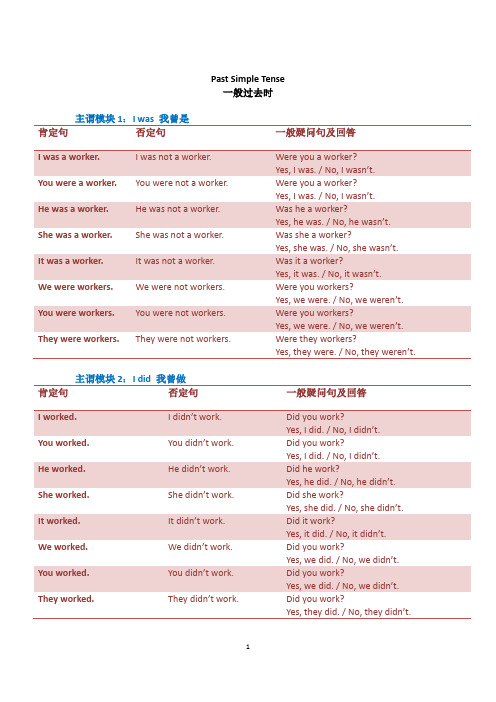
Past Simple Tense一般过去时主谓模块1:I was 我曾是肯定句否定句一般疑问句及回答Yes, I was. / No, I wasn’t.He was a worker. He was not a worker. Was he a worker?Yes, he was. / No, he was n’t. She was a worker. She was not a worker. Was she a worker?Yes, she was. / No, she was n’t.It was a worker. It was not a worker. Was it a worker?Yes, it was. / No, it was n’t.We were workers. We were not workers. Were you workers?Yes, we were. / No, we were n’t. You were workers. You were not workers. Were you workers?Yes, we were. / No, we were n’t. They were workers. They were not workers. Were they workers?Yes, they were. / No, they were n’t.主谓模块2:I did 我曾做肯定句否定句一般疑问句及回答Yes, I did. / No, I did n’t.He worked. He did n’t work.Did he work?Yes, he did. / No, he did n’t. She worked. She did n’t work. Did she work?Yes, she did. / No, she did n’t. It worked. It did n’t work. Did it work?Yes, it did. / No, it did n’t.We worked. We did n’t work. Did you work?Yes, we did. / No, we did n’t. You worked. You did n’t work.Did you work?Yes, we did. / No, we did n’t. They worked. They did n’t work.Did you work?Yes, they did. / No, they did n’t.标准句子结构●主谓模块1+X+时间模块I was a worker then. 那时我还是一个员工。
中考英语三年重点语法-一般过去时的讲解与练习
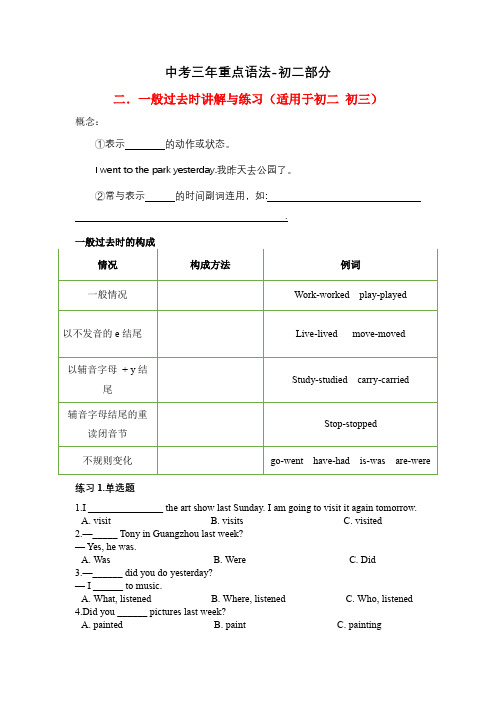
中考三年重点语法-初二部分二.一般过去时讲解与练习(适用于初二初三)概念:①表示的动作或状态。
I went to the park yesterday.我昨天去公园了。
②常与表示的时间副词连用,如:.练习1.单选题1.I _______________ the art show last Sunday. I am going to visit it again tomorrow.A.visitB.visitsC.visited2.—_____ Tony in Guangzhou last week?— Yes, he was.A.WasB.WereC.Did3.—______ did you do yesterday?— I ______ to music.A.What, listenedB.Where, listenedC.Who, listened4.Did you ______ pictures last week?A.paintedB.paintC.painting5.There _____so many cars in my city now but there _____not many before.A.are, areB.are, wereC.were, are6.He went to Huizhou ________________.A.nowB.tomorrowC.yesterday7.The air in our city ________ clean in the past, but now it ________ dirty.A.is; isB.was; isC.is; was8.—________—Yes, I bought a kite.A.Do you buy anything?B.What did you buy?C.Did you buy anything?9.I went to the insect museum and ________ a lot about insects.A.learnB.learntC.learns10.Did you ______ last weekend?A.had a coldB.have coldC.have a cold练习2.判断题11.Did you went to see the ice?12.There were many people now.13.Did you had a good time?14.Do you go anywhere in winter?15.I made a snowman last winter.练习3.填空题16.My friends and I ________ (go/went) to Ocean Park last weekend.17.Yesterday morning my brother ________ (go/went) to work by taxi. Tomorrow he ________ (go/will go) by bike.18.He ________ (cook/cooked) it and had a delicious meal.19.Yesterday evening my aunt ________ (helped/ helps) me with my English.20.Joy worked with wild animals.She________(find/found)a lion on her way home.21.She________(couldn't, can't)speak before.练习5.语法填空22.________ (are) you at school yesterday?23.My mother________ (cook) noodles yesterday.24.We________ (buy) a watermelon yesterday.25.Mum and I ________ (buy) some bananas yesterday.26.Amy ________ (have) a cold yesterday.27.Amy's father________ (take) her to the hospital yesterday.28.—Did you go ________(shop) yesterday?—No, I didn't. I ________(sing) and ________(dance) with my friends.st week we ________ (pick) many apples on the farm.练习6.句型转换30.They played games yesterday. (改为否定句)31.Did you watch TV? (作否定回答)No,________ ________.32.Lingling has some chocolate. (改为一般过去时)Lingling ________ some chocolate.33.Liu Tao did his homework last week.(对划线部分提问)________________Liu Tao ________last week?34.The kites were in the park.(对划线部分提问)________ ________ the kites?35.Sam had a good time last Saturday.(改为一般疑问句)________ Sam ________ a good time last Saturday?36.There were some fashion shows at school yesterday.(改为否定句)There ________ ________ fashion shows at school yesterday.练习7.补全对话37.看图片,写出相应的答句或问句。
初一英语语法:一般过去时(共22张PPT)
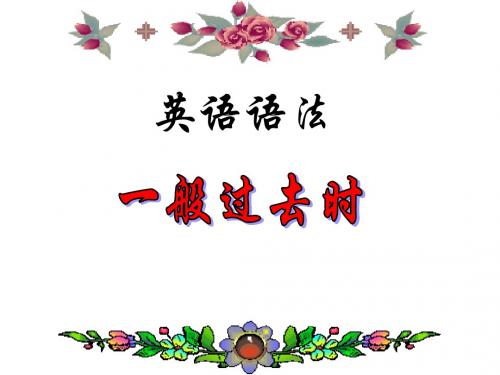
cost →cost花钱
read→read读书
cut → cut 砍,剪 hurt → hurt受伤
2)变元音字母为a run→ran跑
give→gave给 sing→sang唱歌
come → came过来 drink→drank喝 swim→swam游泳
sit→sat坐下 begin→began开始
feel build fight give teach sing buy cut come draw drink drive hope use start
felt built fought gave taught sang bought cut came drew drank drove hoped used started
2. watch, John, did, TV, weekend, last. _J_o_h_n_d_i_d_w_a_t_ch__T_V_l_as_t_w_e_e_k_e_n_d_. ___________
3. went, I ,to, by, park, a, bike
_____I _w_e_n_t_t_o__a_p_a_r_k_b_y__b_ik_e__. ___________ 4. jumped, the, into, lake, he, and, the, to, swam, kite.
19) My sister _w_a__s_ (be) born on June 5. 1996. 20) W__e_r_e_ (be) your parents at home just now? 21) He _s_tu__d_ie_d_ (study) French here last year. 22) She __d_i_d_ (do) homework last night. 23) They _w__e_n_t(go) to the zoo yesterday morning. 24) We __h_a_d_ (have) a party last Saturday. 25) Joy _v_is_i_te__d (visit) me yesterday evening. 26) They __l_iv_e_d_ (live) here two years ago. 27) He _w__a_s_(be) here a moment ago.
初中英语语法专项:一般过去时
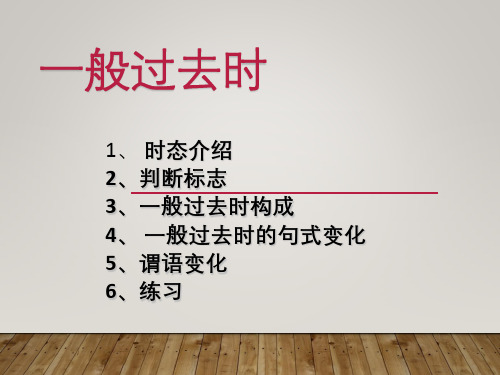
• 6S. Mhey misonth’tergliokeins ghertostugdoenstsh.o(变pp一in般g疑to问m句o)rrow.
写出下列动词的过去式:
go
went
use
think thought live
be
was/ were wake
happen happened keep
give gave
say
become became clean
get got
buy
rain rained play
stay stayed learn
pass passed see
answer answered read
used lived woke kept said cleaned bought played learnt/ed saw read
run ran borrow borrowed grow grew watch watched write wrote smile smiled open opened begin began swim swam carry carried study studied
4、一般过去时句式变换
一般过去时态句式的构成
陈述句式
动词
肯定式
否定式
I was ….
I was not(wasn’t)….
He /She/it was…. He/She/It was not(wasn’t)…. be We/You/They were …. We/You/They were not
•元浊 /d/ ,即 ed 在元音,浊 辅音后面念 /d/ ,
英语语法--一般过去时讲解与练习
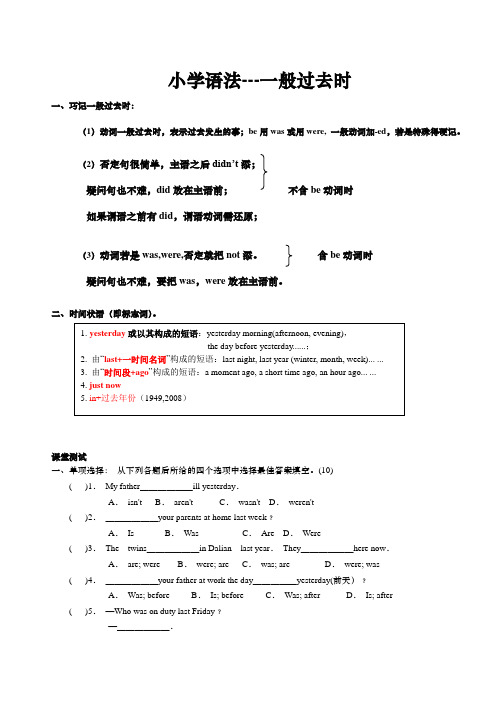
小学语法---一般过去时一、巧记一般过去时:(1)动词一般过去时,表示过去发生的事;be用was或用were, 一般动词加-ed,若是特殊得硬记。
(2)否定句很简单,主语之后didn’t添;疑问句也不难,did放在主语前;不含be动词时如果谓语之前有did,谓语动词需还原;(3)动词若是was,were,否定就把not添。
含be动词时疑问句也不难,要把was,were放在主语前。
二、时间状语(即标志词)。
1.yesterday或以其构成的短语:yesterday morning(afternoon, evening),the day before yesterday......;2. 由“last+一时间名词”构成的短语:last night, last year (winter, month, week)... ...3. 由“时间段+ago”构成的短语:a moment ago, a short time ago, an hour ago... ...4. just now5. in+过去年份(1949,2008)课堂测试一、单项选择:从下列各题后所给的四个选项中选择最佳答案填空。
(10)( )1.My father______ill yesterday.A.isn't B.aren't C.wasn't D.weren't( )2.______your parents at home last week﹖A.Is B.Was C.Are D.Were( )3.The twins______in Dalian last year.They______here now.A.are; were B.were; are C.was; are D.were; was ( )4.______your father at work the day_____yesterday(前天)﹖A.Was; before B.Is; before C.Was; after D.Is; after ( )5.—Who was on duty last Friday﹖—______.A.I am B.I was C.Yes, I was D.No, I wasn't ( )6. I cleaned my classroom ___________.A with three hoursB three hours agoC in three hoursD three hours before( ) 7. I came _______ my house two days ago .A back onB back toC to backD back( ) 8 . ___________? He did some reading at home.A What does your father do yesterday eveningB What does your brother do in the schoolC What did your brother do over the weekendD Where did your brother go last Sunday二、请用正确动词形式填空。
初中英语语法一般过去时专项讲解及练习

初中英语语法一般过去时专项讲解及练习一般过去时是英语中常用的时态之一,用来表示发生在过去某个具体时间的动作或状态。
以下是一般过去时的用法及一些练题。
一般过去时的用法1. 表示过去某个具体时间发生的动作或状态。
- I played football yesterday.(我昨天踢了足球。
)- She was a teacher two years ago.(两年前她是一名老师。
)2. 表示过去经常性、惯性的动作或状态。
- We always went swimming in the summer.(我们夏天经常去游泳。
)- He used to live in the countryside.(他过去住在乡下。
)3. 表示过去的客观事实或真理。
- The sun rose in the east.(太阳从东方升起。
)- She knew the answer.(她知道答案。
)一般过去时练题请根据句子的意思,在括号中填上适当的动词的过去式。
1. My friend __________ (visit) me last week.(我朋友上个星期来看我。
)2. They __________ (watch) a movie yesterday evening.(他们昨晚看了一部电影。
)3. Helen and I __________ (play) tennis together when we were children.(海伦和我小时候一起打网球。
)4. He __________ (not go) to school yesterday because he was sick.(他昨天因为生病没去上学。
)5. We __________ (live) in that house for five years before we moved.(我们在那个房子住了五年才搬走。
)总结一般过去时用于表示过去某个具体时间发生的动作或状态,过去的经常性、习惯性动作或状态,以及客观事实或真理。
高中英语最实用语法一般过去时、现在完成时、将来完成时讲解和经典习题
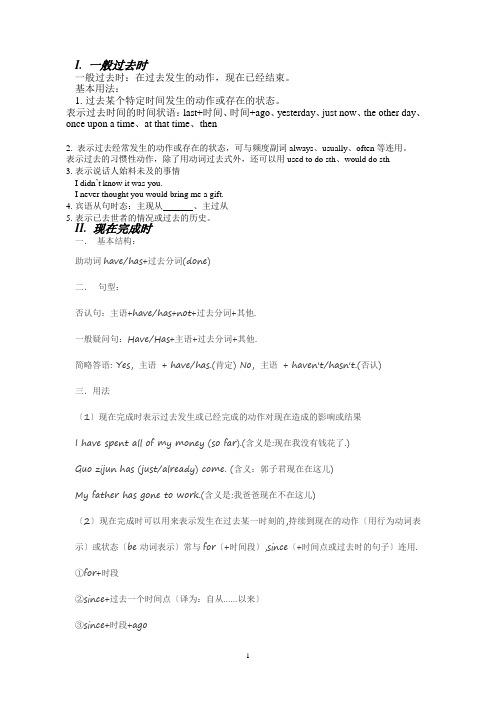
I. 一般过去时一般过去时:在过去发生的动作,现在已经结束。
基本用法:1.过去某个特定时间发生的动作或存在的状态。
表示过去时间的时间状语:last+时间、时间+ago、yesterday、just now、the other day、once upon a time、at that time、then2. 表示过去经常发生的动作或存在的状态,可与频度副词always、usually、often等连用。
表示过去的习惯性动作,除了用动词过去式外,还可以用used to do sth、would do sth3.表示说话人始料未及的事情I didn’t know it was you.I never thought you would bring me a gift.4.宾语从句时态:主现从、主过从5.表示已去世者的情况或过去的历史。
II. 现在完成时一.基本结构:助动词have/has+过去分词(done)二.句型:否认句:主语+have/has+not+过去分词+其他.一般疑问句:Have/Has+主语+过去分词+其他.简略答语: Yes, 主语+ have/has.(肯定) No, 主语+ haven't/hasn't.(否认)三.用法〔1〕现在完成时表示过去发生或已经完成的动作对现在造成的影响或结果I have spent all of my money (so far).(含义是:现在我没有钱花了.)Guo zijun has (just/already) come. (含义:郭子君现在在这儿)My father has gone to work.(含义是:我爸爸现在不在这儿)〔2〕现在完成时可以用来表示发生在过去某一时刻的,持续到现在的动作〔用行为动词表示〕或状态〔be动词表示〕常与for〔+时间段〕,since〔+时间点或过去时的句子〕连用.①for+时段②since+过去一个时间点〔译为:自从……以来〕③since+时段+ago④主句〔现在完成时〕since+从句〔一般过去时〕→主完从过●⑤It is/ has been +时段+since+从句〔过去时〕Mary has been ill for three days.I have lived here since 1998.⑥It is + 第几次〔the first time〕that + 句子〔现在完成时〕四. has gone (to),has been (to), has been (in) 的区别Have/Has gone(to) :去了(现在不在说话现场)Where is your father?He has gone to Shanghai.Have/Has been (to) :去过〔已不在去过的地方〕My father has been to Shanghai.Have/has been in:呆了多久〔还在所呆的地方〕My father has been in Shanghai for two months. /since two months ago. 五.现在完成时的标志1. 现在完成时的含义之一是过去完成的动作对现在仍有影响,用以下四大标志词可以表达这种含义:* 以already, just和yet为标志He has already got her help. 他已得到她的帮助。
七年级英语语法一般过去式及练习

一般过去时1. 一般过去时的用法。
2. 一般过去时的谓语动词形式。
3. 一般过去时的谓语动词过去式的构成。
4. 一般过去时的句式。
(放在下一讲中)。
5. 一般过去时与一般现在时等时态的区别。
6. 中考中对该知识点的考查常以单项选择题、动词应用题、句型转换题等题型出现,分值1-2分。
一、知识精讲(一)一般过去时的用法:1. 一般过去时表示过去某个时间发生的动作或存在的状态。
【例句】We cleaned the classroom yesterday.我们昨天打扫了教室。
状元典例—What did you do yesterday evening?—I _____ my homework.A. doB. didC. doesD. am doing答案:B思路分析:根据问句“昨天晚上你做了什么?”可知答语的动作发生在过去,即:昨天晚上。
故应用一般过去时。
浏览各选项可知B项表示过去时态,是do的过去式。
2. 一般过去时也表示过去经常或反复发生的动作。
【例句】They often went to work by bike last year.他们去年常常骑自行车去上班。
状元典例The boy often_______ for his tests last year.A. studyB. studiedC. studiesD. studyed答案:B思路分析:句中虽然有often,但不能用一般现在时,因为句末有表示过去的时间状语last year;本句表示过去经常性、习惯性的动作;study的过去式为studied,故选B项。
句意为“去年这个男孩经常为测验而学习”。
(二)一般过去时谓语动词的构成:一般过去时有两种谓语动词:1. 系动词be,构成的肯定句式为:主语+was/ were +其他【例句】He was at home yesterday. 昨天他在家。
Lucy and Lily were in the library last night. 露西和莉莉昨晚在图书馆。
- 1、下载文档前请自行甄别文档内容的完整性,平台不提供额外的编辑、内容补充、找答案等附加服务。
- 2、"仅部分预览"的文档,不可在线预览部分如存在完整性等问题,可反馈申请退款(可完整预览的文档不适用该条件!)。
- 3、如文档侵犯您的权益,请联系客服反馈,我们会尽快为您处理(人工客服工作时间:9:00-18:30)。
一般过去时1. 一般过去时的定义①一般过去时表示过去某个时间发生的动作或存在的状态,常和表示过去的时间状语连用。
如yesterday,the day before yesterday,last week,in 2015,three days ago,the other day,just now,at the moment,this morning,once upon atime,long long ago。
—What did you do yesterday? 昨天你做了什么?—I went swimming. 我去游泳了。
②表示过去经常性或习惯性发生的动作。
When I was at middle school, I often went to school by bike. 我读中学时经常骑自行车去学校。
2. 一般过去时的基本结构①实义动词肯定句:主语+ 动词过去式+ 其他.Iwent to the cinema yesterday. 我昨天看了电影。
否定句:主语+ didn’t + 动词原形+ 其他。
Ididn’t go to the cinema yesterday. 我昨天没看电影。
一般疑问句及其回答:Did + 主语+ 动词原形+ 其他?肯定回答:Yes, 主语+ did.否定回答:No, 主语+ didn’t / did not.—Did you go to the cinema yesterday? 你昨天去看电影了吗?—Yes, I did./No, I didn’t. 是的,我去了。
/ 不,我没去。
特殊疑问句:特殊疑问词+did+主语+动词原形+其他?—Where didyou go yesterday? 你昨天去哪儿了?—I went to the cinema yesterday. 我昨天去看电影了。
②be 动词肯定句:主语+ was/were + 其他.Iwas at home yesterday. 我昨天在家。
否定句:主语+ wasn’t/weren’t +其他.Iwasn’t at home yesterday.我昨天没在家。
一般疑问句及其回答:Were/Was+ 主语+ 其他?—Were you at home yesterday? 你昨天在家吗?—Yes, I was. / No, I wasn’t. 是的,我在家。
/ 不,我不在家。
特殊疑问句:特殊疑问词+ were/was + 主语+ 其他?—Where were you yesterday? 你昨天在哪?—I was at home yesterday. 我昨天在家。
3. 动词过去式的变化规则情况构成方法例词一般情况加-ed wash→washed help→helped以不发音的字母e结尾加-d hope→hoped like→liked以辅音字母+ y 结尾变y 为i,再加-ed carry→carried study→studied结尾只有一个辅音字母的重读闭音节双写末尾的辅音字母,再加-ed stop→stopped plan→planned4. 一般过去时的用法(1)表示在过去某个时间所发生的动作或所处的状态。
常与yesterday, last week, in 1989, just now, a moment ago, the other day 等连用。
He was here just now. 他刚才还在这里。
What did you do yesterday? 你昨天做了什么事?(2)在过去一段时间内的经常性或习惯性动作。
We often played togetherwhen we were children. 我们小时候常在一起玩。
注意:表示过去经常发生的动作还可用used to 和would。
He used to smoke a lot, buthe doesn’t now. 他过去经常抽烟,但现在不抽了。
Whenever we were in trouble, he would help us.每当我们遇到困难,他都会帮助我们。
(3)表示主语过去的特征或性格。
At that time she was very good at English. 那时她英语学得很好。
(4)用在状语从句中表示过去将来。
He said he would wait until they came back.(5)一般过去时有时可以表示现在,多与want, hope, wonder, think, intend 等动词连用,使语气更委婉。
Iwondered if you could help me. 不知你能不能帮我一下。
有时用一般过去时也是时态一致的需要。
Ididn’t know you were here. 我不知道你在这里。
注意:(1)表示一系列的动作,尽管有先后,都用一般过去时,最后两个动词之间用and 连结。
He opened the door, rushed out and then disappeared. 他打开门,冲了出去,然后就消失了。
(2)注意在语境中理解"我刚才/原来还不……"。
—Your phone number again? I didn’t quite catch it. 请再说一次你的电话号码,好吗?我刚才没听清楚。
—It’s 2566666. 是2566666。
5. 一般过去时代替完成时(1)两个动作如按顺序发生,又不强调先后,或用then,and,but 等连词时,多用一般过去时。
When she saw the mouse, she screamed.My aunt gave me a hat and I lost it.(2)两个动作相继发生,可用一般过去时;如第一个动作需要若干时间完成,用过去完成时。
When I heard thenews, Iwas very excited.(3)叙述历史事实,可不用过去完成时,而只用一般过去时。
Ourteachertold us that Columbus discovered America in 1492.一般过去时肯定句的过去式,规则动词加-ed,不规则的必须记。
否定形式疑问句,没有be 加did。
如把did 加在前,动词也要还原形。
1. —Has Lucy goneback to her home in the US?—Yes. She _________ here only for three dayswith her friend.A. stayedB. will stayC. has stayedD. was staying2. —Guess what! The great movie is on in the cinema.—Nothing new. I __________ it with my parents on the first day.A. sawB. seeC. will seeD. have seen3. —Ihear they __________ the car company in 2006.—Yes, it has a history of over ten years.A. foundB. are foundingC. foundedD. were founding4. Maria ________ at 4:30 this morning and couldn’t fall asleep.A. woke upB. was woken upC. wakes upD. is woken up5. While his dad ________ out, Steve decided to play games on the computer.A. isB. wasC. will beD. has been6. Mark Twain _________ at the age of 75 in 1910.A. diedB. deadC. death7. She ________ a disabled man at last, which made her parents mad.A. marriedB. got marryingC. had marriedD. had been married to8. I _________ while reading the English textbook. Luckily, my roommate woke me up in time!A. was falling asleepB. have fallen asleepC. fell asleepD. falls asleep9. —Ihave ever read the book Alice in Wonderland Ⅱ.—When _________?—Two weeks ago.A. did you read itB. have you read itC. do you read itD. will you seeit10. —I haven’t been back to myhometown — Hainan.—So have I. Thesmell of the sea __________ memories of my childhood.A. called upB. calls upC. will call upD. had called up1. (2019 •泰州市)—Have you ever been to Shanghai?—Of course.Actually, I ___________ there for six years but nowI live in Taizhou.A. workedB. was workingC. would workD. have worked2. (2019 •湖北省武汉市)He ___________ his English teacherwhen he was sightseeing in Paris.A. has metB. had metC. metD. would meet3. (2019 •河北)He ___________ me his name, but I can’t remember itnow.A. tellsB. will tellC. toldD. is telling4.(2019 •湖南长沙)I ___________ abroad for several years, but I have never regretted my final decision to moveback to my motherland.A. am livingB. livedC. have lived5.(2019 •江苏省南京市)—Wendy, how long haveyou had the Huawei P30 Pro? —Acouple of days. I ___________ it last week.A. boughtB. buyC. will buyD. have bought6. (2019 •大庆市)—My car _____ yesterday. Could you please give me a ride tomorrow?—I’m sorry I can’t, I’m ___________ Dalian tomorrow morning.A. breaks down; flying atB. has broken down; flying atC. broke down; flyingtoD. had brokendown: flying to7. (2019 •四川省广元市)—What did you do the day before yesterday?—I __________ for an English test.A. studyB. studiedC. studying8. (2019 •湖北省黄石市)In February, Chinese tech company Huawei ___________ Mate X, a foldable(可折叠的)5G mobile phone.A. is introducingB. introducedC. introducesD. was introduced9. (2019 •镇江市)Yao Ming, a basketball giant, ___________ water polo when he was young.A. is playingB. used to playC. is used to playingD. was playing10. (2019 •湖南省邵阳市)—Jack, you look more handsomein your new shirt today.—Oh. really? I ___________ it in a cheap store with my mom.A. buyB. will buyC. bought11. (2019 •四川省广元市)—Whatdid you do theday before yesterday?—I __________ for an English test.A. studyB. studiedC. studying12. (2019 •云南省昆明市)—Where did you go last winter vacation?—I to London with my family.A. goB. have goneC. wentD. was going1. (江苏省江阴市澄要片2019 年5 月中考模拟考试)The students’interest in Chinesepaper-cutting ________a lot after a folk artist gave them a talk.A. hasrisenB. risesC. roseD. was rising2. (天津市红桥区2018-2019 年度第二学期九年级中考三模)In the bookshop, a reader asked the shopkeeper________ Harry Potter ________an interesting book?A. whether; areB. how; isC. that; wasD. if; was3. (湖北省襄阳市2017 届九年级一轮复习测试)—Has Mary ever visited Tower Bridge ?—Yes, She ______________ it two years ago.A. visitsB. visitedC. fromD. was visiting4.(四川省峨眉山市2017 届九年级第二次调研)I still remember my happy childhood when my mother______________ me to Disneyland at weekends.A. tookB. takesC. will take5. (黑龙江省牡丹江管理局北斗星协会2017 届九年级二模)—Have you been to Beijing?—Yes, I ______________ there two years ago.A. havebeenB. wentC. will go6. (江苏省连云港市2017 届九年级模拟)—President Xi ______________ a visit to three countriesin MiddleEast fromJan.19 to 23.—This was his first visit in 2016.A. paidB. will payC. has paidD. is paying7.(湖北省武汉市黄陂区部分学校2017 届九年级模拟)—Jenny is not coming for the party tonight.—But she ______________.A. promisesB. promisedC. will promiseD. had promised8.(湖南省邵阳县2017 届九年级5 月优秀毕业生选拔考试)—Have you ever seen the film?—Yes, I ______________ itlast month.A. seeB. sawC. have seen9. (山东省滨州博兴县2017 届九年级学业水平模拟)—Tony, look out! Don’t stand so close to the pool.—Thank you. I ______________ it.A. don’t noticeB. haven’t noticedC. didn’t noticeD. wasn’t noticed10.(四川省成都外国语学校2018 届九年级下学期一诊考试)Britain ______________ to leave European Unionlast year. David Cameron, former Prime Minister ______________ since then.A. decided; retiredB. decided; has been retiredC. has decided; retiredD. has decided; has retired11.(山西农业大学附属中学2017 届九年级中考适应性训练)One of the popular expressions in 2012______________"Positive energy".A. isB. areC. was12. (徐州市2017 年初中毕业、升学考试模拟)—Sorry, Mom! I am late. —What a pity! Jenny ______________ here to see you. She should be on her way home now.A. isB. wasC. had beenD. will be跟踪训练1. A 【解析】句意:——露西回到她在美国的家了吗?——是。
